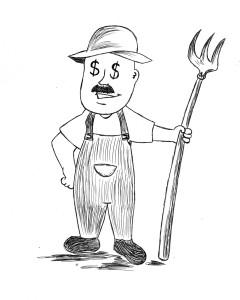The staff editorial is the majority opinion of The Murray State News Editorial Board.

In a society that, for decades, adopted a zero-tolerance attitude toward drugs, it makes sense that the word, “hemp” sparks mass amounts of controversy.
However, recent legislation to allow hemp growth in Kentucky may bring hemp back as an economic game changer.
Hemp growth will likely be an attractive option for Bluegrass farmers. The plant’s growth was first banned by the Drug Enforcement Agency in 1958.
Before the ban, the Bluegrass State saw more revenue from hemp than tobacco, which is now our number one cash crop.
Kentucky is an agricultural powerhouse, so the decision to grow hemp could bring serious money in a time of looming budget cuts and statewide debt.
Murray State is one of five Kentucky colleges that will begin research to examine the ability of hemp to remove environmental toxins, then reporting their research to the state.
As a University that takes pride in its schools of Agriculture, hemp research will enhance horticultural programs and better prepare students for careers in the potentially booming hemp textile industry.
Because of its botanical relation to the marijuana plant, hemp received a negative reputation, despite its absence of any psychoactive chemicals that could produce a high.
Hemp cannot produce a high when ingested, unlike marijuana, and can be made into approximately 25,000 different products.
America’s attitude toward hemp has made us turn a blind eye to the possibilities of its use as a renewable, reliable textile.
Hemp has strong potential to be a commodity for Kentucky, which is why it is important that we stop categorizing it with cannabis.
The plant used to grow wild before attempts to remove it completely, which means Kentucky’s soil is ideal for growing and maintaining it.
Cotton, one of the nation’s leading textiles, requires more energy and water to grow than hemp. Hemp fibers are also stronger than cotton, and hemp requires no pesticides to grow. By harnessing hemp, Kentucky would save money on pesticides and receive hefty profit.
According to the Colorado Springs Business Journal, the U.S. hemp industry has a $450 million value.
Countries like China, who export hemp and promote its growth, received more than $2 billion in profit.
Little can be said about the negative side effects of growing hemp.
One argument against hemp growth is that drug enforcement has a hard time distinguishing the difference between hemp and its more illicit cousin, marijuana, when searching for growing sites in helicopters
For all the benefits Kentucky could reap as a large distributor of hemp, police confusion is a small price to pay.
The argument pales in comparison to hemp’s ideal use as a textile, oil producer and economy game changer.
This bill would not let farmers grow hemp as they please. Farms must be qualified to grow hemp, then given a license.
They would be subject to high regulation from the state, which nullifies any argument that hemp industrialization and law enforcement would be unable to sync.
For decades, we abandoned the idea that hemp is a crop with a multitude of benefits.
It’s time to negate old stigmas that the plant is harmful and seize the opportunity that Kentucky’s soil has given us.